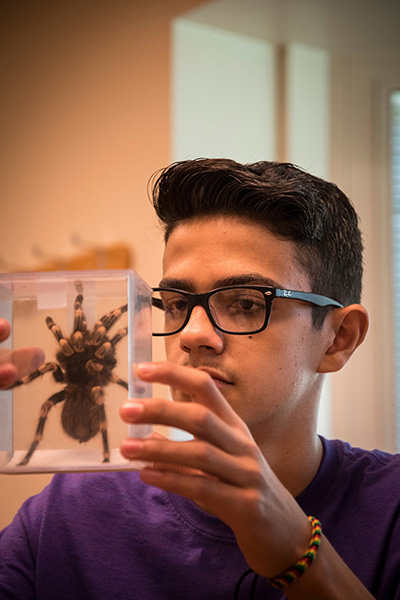Mentor program expands mission
Thursday, July 27, 2017

Gathered in a conference room in Martin Regional Library in Tulsa, surrounded by their friends and family, local high school students were battling it out “Shark Tank” style.
Instead of pitching their businesses to multimillionaires and billionaires, like on the popular television show, these students were competing for cash rewards; first place would win $100, while second place would take home $60. Teams of participants in the Juntos program, which mentors at-risk Latino youth and their families, were tasked with coming up with a new product to fill a specific need, identifying a market and giving a presentation to a panel of judges.
“The pitch competition represented the culmination of a pilot project focused on entrepreneurship,” said Dave Shideler, associate professor in Oklahoma State University’s Department of Agricultural Economics. “I became involved with Juntos when students requested additional programming so they could keep meeting together; youth entrepreneurship seemed like a natural fit with such an industrious and eager group that took this kind of initiative.”
The teams developed a wide array of products including a customizable clothing company, a smart lawnmower and two makeup innovations; one that can match foundation with any skin tone and another that won’t run when your face gets sweaty.
It was the clothing line, which incorporated motivational phrases about never giving up, that took top honors as the event come to a close.
Though the pitch competition had concluded, the Juntos program was far from over. Offered through the Tulsa County OSU Cooperative Extension office, there are four main components of the program. The first is Family Engagement, which consists of a 6-week workshop series full of family nights and events. There also are monthly Family Nights, featuring public speakers who focus on life skills and community engagement.
The third component is One-on-one Success Coaching by an adult who provides mentorship on academic success. The final main element is the Juntos Summer Programming, which includes the Summer Academy and trip to OSU in Stillwater.
“Juntos Summer Academy is a place where youth are able to explore a future outlook and immerse themselves in an environment that nurtures growth,” said Carola Muñoz, program coordinator. “This experience at OSU is where 80 Latino middle and high school youth were able to experience new things and learn more about the college world.”
Youth participates in hands-on activities that gave them the opportunity to experiment, analyze and reflect on their identity. In addition, participants explored ways in which they are able to positively create change in their communities and the world around them.
The participants got a firsthand look at some of the things the College of Agricultural Sciences and Natural Resources has to offer.

Their options during the Academy were broad, as some learned about insects, while others took a tour of the Robert M. Kerr Food and Agricultural Products Center at OSU. There were classes and workshops on gardening, landscape architecture, geography, entrepreneurship, cow and calf production and much more.
During the innovation workshop, students were challenged to identify a problem they face regularly and propose a solution.
“The students rose to the challenge and came up with great ideas for new inventions that included a ‘GoPro’-like device that fits on pet collars to help locate lost pets, a machine to make one’s bed, a ‘smart desk’ that eliminates the need for lockers and a parachute-device to minimize damage to falling smartphones,” said Shideler.
Even if it was just for a couple days, the participants got an idea of the types of things they can do in the future and what OSU can offer them.
“The Juntos Summer Academy provides the students with an opportunity to get inside of OSU’s classrooms, laboratories and even Agricultural Experiment Station facilities, and get a taste of life in college; being on campus, and realizing that college is attainable and accessible to them,” said Shideler. “The hope is that the Juntos students will pursue college and expand their career opportunities and ambitions.”
The program began in two Tulsa school systems in the 2013-2014 academic year and has grown every year, with more than 210 students currently participating. Meaning “together” in Spanish, Juntos works to unite community partners to provide Latino 7th through 9th grade students, and their parents, with knowledge, skills and resources to prevent youth from dropping out of school and to encourage families to work together to gain access to college.
“Research shows that Latino youth are at greatest risk for dropping out of school between the 9th and 10th grades,” said Muñoz. “The Juntos program reduces this risk by bringing together cohorts of 7th, 8th and 9th grade youth to support each other for 3-5 years as they enter high school and prepare together for higher education.”
The program helps Latino students understand the American education system, which is sometimes drastically different than what they’re used to in their native countries.
“In most Central American countries and Mexico, public education ends in 8th grade, so Juntos helps the parents and students understand the purpose of high school and the opportunities for college,” Shideler said. “Additionally, these students and parents are provided with tools to enable the students to succeed in high school as well as pursue higher education.”
Perhaps one day, some of the skills and experiences acquired through the Juntos program, coupled with a lot of hard work, might just lead some of the participants back into the shark tank; just on the other side of the table.
